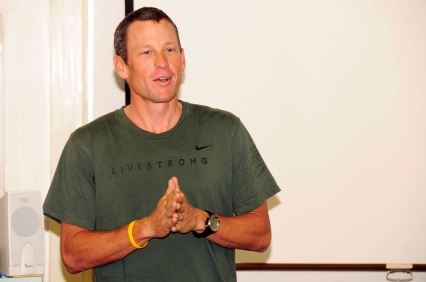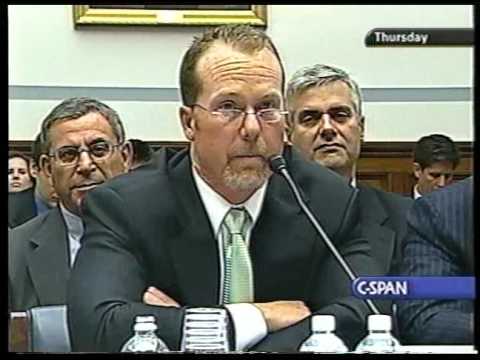Lance Armstrong Doping Allegations: Deny and Defend?
Editor’s Note: This article is by Christina Mozaffari, Senior Media Trainer, Phillips Media Relations.
As a media trainer and a former journalist, I tell my clients never to lie to reporters, especially in a crisis. Once the truth comes out—and it usually does—you lose any credibility you may have had and become a completely unreliable source in the future.
Which is why I’m torn thinking about the recent developments in Lance Armstrong’s current battle against doping charges. The Washington Post reports the seven-time Tour de France winner is being accused by the US Anti-Doping Agency (USADA) of a “massive doping conspiracy” from 1998-2007 witnessed by more than 10 cyclists.
Armstrong released a strong statement on his website yesterday denying the allegations, saying:
“I have never doped, and, unlike many of my accusers, I have competed as an endurance athlete for 25 years with no spike in performance, passed more than 500 drug tests and never failed one. That USADA ignores this fundamental distinction and charges me instead of the admitted dopers says far more about USADA, its lack of fairness and this vendetta than it does about my guilt or innocence.”
This is not the first time Armstrong has faced these charges. The US Attorney’s Office in Los Angeles investigated Armstrong for two years before terminating its inquiry in February without charging him. In that case, two of his former teammates testified in public that Armstrong was doping.
Which gets us to the big question: Assuming, for the sake of argument, Armstrong did dope, what should he do? Should he come clean and put this whole mess to rest, relinquish his seven Tour de France titles and jeopardize his fundraising prowess for his Livestrong Foundation? Or, should he continue to deny the allegations and defend himself in the court of public opinion?
Complicating the matter, a confession would not send Armstrong to jail. The USADA cannot prosecute him criminally; it can only strip him of his titles and prevent him from competing in future events. So this really is solely a matter of Armstrong’s reputation.
Past athletes who have admitted to taking performance-enhancing drugs have not fared well. Take Mark McGwire, for example, who in 2005 pleaded “no comment” when asked during a Congressional hearing whether he had ever taken steroids. The public convicted him of being a cheat, and his reputation has never recovered. He finally confessed the obvious in 2010, and has been on the outside of the Baseball Hall of Fame looking in ever since.
Former Olympic champion Marion Jones faced a similar fate when she confessed to taking performance-enhancing drugs and lying about them to a grand jury. She was stripped of her five Olympic medals and the promising career and sports endorsements she once had.
Our firm wouldn’t represent a client that we knew was lying. But assuming that Armstrong is guilty, is his best PR move to deny and defend? Is this an exception to the “never lie” rule?
UPDATE: June 29, 2012: According to one of Lance Armstrong’s lawyers, the U.S. Anti-Doping Agency voted today to officially charge Armstrong with doping and being part of a doping conspiracy.
What do you think? Please leave your thoughts in the comments section below.





If he is guilty than he’s in a very big predicament.
Getting stripped of his title and going down in history as a cheat, or attempting to cover it up and still hurting his reputation by those who have made up their judgement and those who are unsure.
What a question!
As much as I despise lies, Id say it depends on how well he believes – realistically – he can get away with it. If he could and learn his lesson (being key) – and of course live with himself (which if he is guilty, Im sure he will have no problem in doing so, since he hasn’t as of yet), than that would be the road most travelled, wouldn’t it?
Otherwise, if there’s a good chance of him being proven guilty, it would be best for him to come clean and have the truth come from him. A good PR professional could think of many angles for which to take that would help him come across as a drug addicted victim, Im sure. He could then hope to get the sympathy vote.
What a controversial yet realistic situation.
Great post, Brad! I may just have to think of an interesting angle to write something over on my blog about this next week!
Melissa from MelissaAgnes.com
[…] Lance Armstrong Doping Allegations: Deny and Defend? Post by Christina Mozaffari I love this post! It raises a question that many are hesitant to answer simply do to its controversial reality. If Lance Armstrong is in fact guilty, what should he do? Continue to deny the allegations or come clean with the truth, lose his titles and reputation, and hope for the best? (Don’t forget to check out my thoughts in the comments section – and take a second to let me hear yours as well!) […]
You are only as good as your name. If he’s guilty — and sadly, it sure looks like he is, though still innocent until proven guilty — then he should fess up. From a practical standpoint, his 7 Tour wins are about to be stripped away, so telling the truth won’t change that; it will only speed it up. Moreover, he’s an incredible athlete in his own right and a stellar anti-cancer champion…plenty of time to rehabilitate his image long term. That black cloud hanging over his name won’t go away on its own. He should be big and bold and go all the way: blow the lid on the open secret that indicates the professional cycling culture is dominated by illegal doping the world over (MLB steroids anyone?) and work to get it fixed like only someone of his stature could achieve.
Sorry, but lying is never the right answer. We live in a gray world, but that’s pretty black and white. Ethical thing to do and — ultimately — would be the smart PR thing to do, as well.
By the way, thus far, LIVESTRONG Foundation handled it right. They transparently noted the charges right on their homepage, CEO statement credited Armstrong for the superb athlete and and cancer survivor/advocate that he is…but he sidestepped merits of the charges and did not refute them (not his role, and may well be proven wrong). Smart PR.
Great post, Brad!
I would agree with Melissa and the other commenters that coming clean is the ethical and proper action if Armstrong is actually guilty of what his accusers are charging.
I would question if there’s anyway for him to win in this instance. As Armstrong points out, he been poked, scrutinized, tested and never popped positive during his 25 years as an endurance athlete. Can anyone that famous in the sports industry stay under the radar that well for so long? Government agencies say no because they can produce witnesses. Does either side make its case or do they bring just enough info to leave only doubt?
Bottom line: just the accusation is enough to irreparably damage Armstrong’s credibility and standing. If he’s innocent, more than 25 years of training and performance are now going to be suspect. If he’s not, I’m willing to bet he’ll be sitting on the same chronic denier bench as Clemens, McQuire and Rose — to name a few.
And I should acknowledge that I realize Christina wrote this great post. I’m just too much in the habit of addressing Brad and hit the “submit” button too fast. My apologies Christina. I really need a weekend …
Thanks to all of you for the great responses!
The disagreement on this board speaks to the complexity of the problem. “Be honest” is almost always the right advice. But in this case, I think Christina raises an important and provocative question.
To other readers, what do you think?
I don’t agree with the premise of this article at all! It assumes that there is a possibility that Lance Armstrong is guilty of doping. I believe that Lance Armstrong is NOT guilty of doping! When he was competing, Armstrong was probably the most drug tested, the most closely watched and the most scrutinized athlete in the world. Fact: Lance Armstrong never failed a drug test. Ever!
Does anyone honestly think that the officials in charge of drug testing weren’t really trying to catch Armstrong if he indeed was doping? I believe the opposite, I think that they, like so many others, were doing everything in their power to catch him. It seems like a great many people have had it out for Armstrong since he started competing in the Tour de France. Armstrong has been dealing with this his whole career. Armstrong had to know that he was going to be tested, probably every day, while he was competing. If he were doping and trying to “cheat” or fool the test, he would have to able to do it successfully every single time. Just one slip up, just one positive test would be enough. He would forever be branded a doper and his credibility would be gone, his titles stripped, his career ruined.
In 2006, the year after Armstrong’s 7th title, Floyd Landis did fail a drug test after stage 17, costing him his title and much more. Do you think the testing officials weren’t trying as hard to catch Armstrong? Or maybe they just got lucky with Landis. There were others, before, during and after Armstrong’s time that tested positive. If Armstrong was doping and was able to escape detection while under the microscope that he was under, then that, instead of his 7 titles, just might be his most impressive accomplishment.
Lance Armstrong is innocent and we should all be defending him